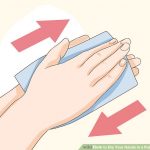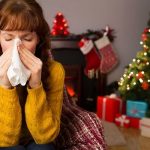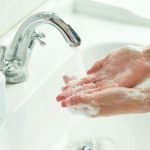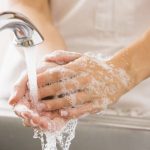To get rid of germs on your hands, you should make sure you’re washing properly. The World Health Organization offers these handwashing guidelines: Get your hands completely wet, then squirt enough soap to cover the entire surface of your hands. Rub your hands together palm to palm, then rub palms over the backs of the…
A hand hygiene and cough etiquette program for elementary school children reduced cases of flu and the number of absences, a new study says. The study included five Pittsburgh schools that received the training program and five schools that received no special hygiene training. Lessons taught to the children in the five-step “WHACK the Flu”…
The overlap of the cold and flu season with the holiday season can make it a challenge to stay healthy as you go to parties and get together with family and friends. Getting a flu shot is important, but other precautions can also reduce your risk of getting sick or of spreading illness to others,…
Nails collect dirt and may spread some infections, so keeping them neat and clean is important. The U.S. Centers for Disease Control and Prevention mentions these suggestions for proper nail hygiene: Trim nails frequently. Use soap and water and a nail brush to scrub under the nails when you wash your hands. Before each use,…
Your dishwasher may get those plates spotless, but it is also probably teeming with bacteria and fungus, a new study suggests. Microbes — from bacteria to viruses to fungi — are everywhere, including within and on the human body. So it’s no surprise, the researchers said, that a kitchen appliance would be hosting them. So…
When it comes to ridding your hands of bacteria, plain old soap is just as good as many “antibacterial” soaps, new research contends. Lab tests conducted by a team of Korean researchers revealed that when bacteria are exposed to the standard over-the-counter antibacterial ingredient known as triclosan for hours at a time, the antiseptic formulation…
Concerns about hospital “superbugs” have spotlighted the need to prevent the spread of germs in health-care settings. But a new report reveals a disturbing lack of knowledge on something as basic as proper cleaning of a patient’s room. Very little research addresses the best ways to disinfect and sanitize the hard surfaces in a hospital…
Too few child care workers follow hand-washing guidelines, a new study suggests. University of Arkansas researchers used video cameras to record the hand-washing habits of adults at an early childhood center in the state. Overall, only 22 percent of the adults followed proper hand-washing procedures before and/or after tasks such as wiping noses, emptying garbage…
Nail biting can leave you with more than just unsightly fingernails — it can have long-term consequences on your health, scientists say. Researchers at the Texas A&M University Health Science Center offer five reasons why you should try to kick the habit. Fingernails have lots of dirt and germs. Chewing your fingernails means those germs…
You don’t need to scald your hands to get rid of germs. For effective hand hygiene, water temperature matters less than time, new research states. The finding runs counter to U.S. Food and Drug Administration guidelines recommending that food establishments and restaurants deliver water at 100 degrees Fahrenheit for hand washing, the researchers said. Scientists…









